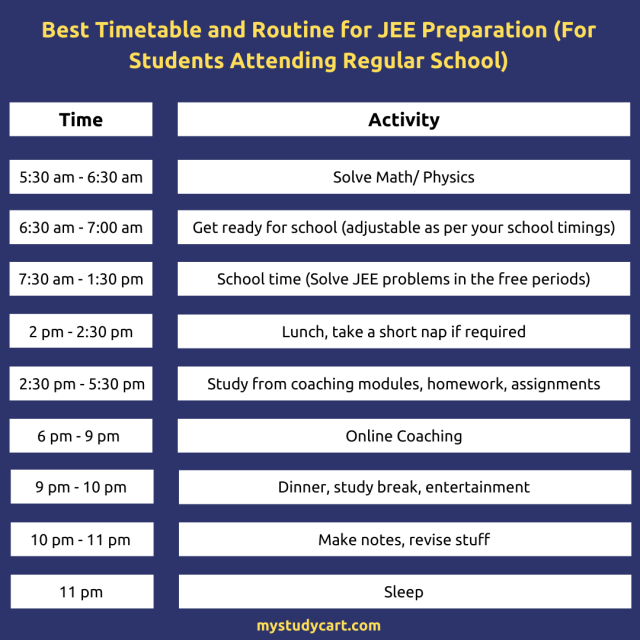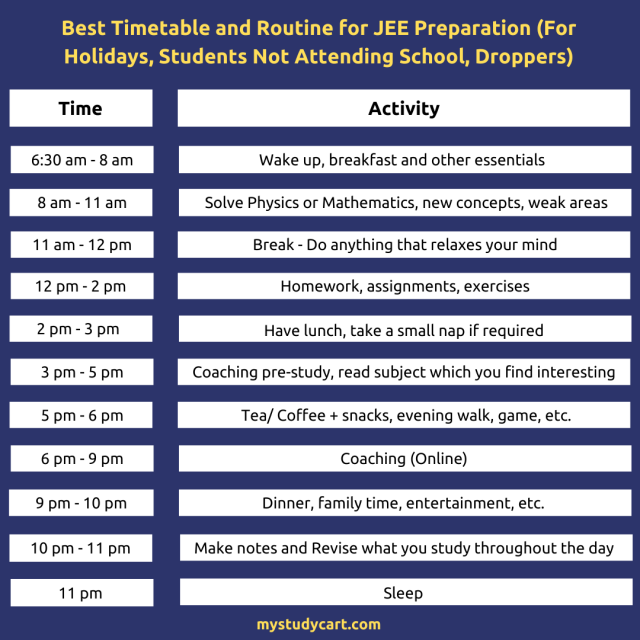
IIT JEE (Mains and Advanced) is one of the most competitive exams in India and worldwide. You want to know the best timetable for JEE preparation, then you have come to the right place. In this post, I will tell you the best timetable for JEE aspirants.
Whether you are attending a regular school, not attending school, a dropper or want a timetable for holidays, you will get that here. I will also share with you the study timetable of one of the IIT toppers.
Best Timetable for JEE Preparation
Making a timetable is very important for JEE preparation. Without it you will not be able to manage time effectively throughout the day. There have been very few students who cleared JEE without following a specific timetable.
Note : This timetable for JEE is flexible and can be customized as per students’ requirements (school and coaching timings).
JEE Timetable For Students Attending Regular School
| Time | Activity |
| 5:30 am – 6:30 am | Solve Math/ Physics |
| 6:30 am – 7:00 am | Get ready for school (adjustable as per your school timings) |
| 7:30 am – 1:30 pm | School timings (Solve problems from question banks in the free periods) |
| 2 pm – 2:30 pm | Lunch, take a short nap if required |
| 2:30 pm – 5:30 pm | Study from coaching modules, homework, assignments |
| 6 pm – 9 pm | Online Coaching |
| 9 pm – 10 pm | Dinner, study break, entertainment |
| 10 pm – 11 pm | Make notes, revise stuff |
| 11 pm | Sleep |
JEE Timetable For Droppers, Students Not Attending School, Holidays
| Time | Activity |
| 6:30 am – 8 am | Wake up, Breakfast and other essentials |
| 8:00 am – 11:00 am | Solve Physics or Mathematics, new concepts, weak areas |
| 11:00 am – 12:00 pm | Break – Do anything that relaxes your mind |
| 12:00 pm – 2 pm | Homework, assignments, exercises |
| 2:00 pm – 3:00 pm | Have lunch, take a small nap if required |
| 3:00 pm – 5:00 pm | Coaching pre-study, read subject which you find interesting |
| 5:00 pm – 6:00 pm | Tea/ Coffee + snacks, evening walk, game, etc. |
| 6:00 pm – 9:00 pm | Coaching (Online) |
| 9:00 pm – 10:00 pm | Dinner, family time, entertainment, etc. |
| 10:00 pm – 11:00 pm | Make notes and Revise what you study throughout the day |
| 11:00 pm | Sleep |
Note: Keep in mind that this is not the best fit timetable for every JEE aspirant. Some students find late night study more productive than morning, for them this timetable may not work well. However, now you have an idea on how to structure your study routine. Adjust the timings as per your requirement.
IIT JEE Toppers Timetable (Daily Routine)
This was the timetable of Aman Goel (AIR-33, JEE Advanced 2013).
- Woke up at around 7.00 AM.
- Freshened up, had breakfast – ready for study by somewhere around 7.45 AM.
- Continuous study session till 11 AM. During the morning session, used to focus a lot on 2 things: weaker areas and new concepts.
- Took a break till around 12 PM.
- Continued for another couple of hours till 2.00 PM.
- Took a break till 3.00 PM.
- Attended coaching classes from 4 – 8 PM. If it was a non-coaching day, another study session from 3 – 5 PM.
- For additional work (if required), another 2 hour long session from 6 PM – 8 PM.
- Never studied after 8 PM partly because he used to get exhausted.
- After 8 PM, the activities usually included dinner, sitting with parents, browsing the internet, playing something.
The best quality about JEE toppers is that they manage their time well between studies and other tasks.
Note : To study for long hours, always take a short break of 5-10 minutes after an hour of study. It will keep you energized and you will not feel exhausted.
Best Timetable for JEE Aspirants 2026, 2027
Best timetable for JEE (with school) [Large Size]

Best timetable for JEE (without school) [Large Size]

16-18 Hours Study Timetable for JEE
A 16-18 hours study timetable for JEE must include time for study and other activities like breaks, entertainment, school, coaching, games, exercise, relaxing time, etc. Make sure you have 7-8 hours of peaceful sleep to get the best result out of your studies.
IIT JEE Timetable – FAQs
Why make a timetable for JEE preparation?
It is important to make a timetable for JEE preparation because when you don’t have a timetable, the day either gets wasted as you try to decide what to study and for how long you need to study, or you find yourself wasting time on unwanted things and stuff. The advantage of having a timetable is once you are finished with a task, you already know what is next on your schedule. Starting your day the same way can motivate you to study consistently, even when you don’t feel like studying.
How many hours a day should I study for JEE?
Don’t count the number of hours, instead try to follow your timetable with discipline. Study all day, every day, as hard as you can. Focus on completing your daily and weekly goals. Number of Study Hours Required to Crack JEE
Which timetable will be the best for JEE?
The timetable that you would be able to follow with utmost efficiency is the best for JEE. You can see the above study routine for students attending school, not attending school, holidays, droppers and toppers. Try to follow the timetable which is best suitable for you.
How to make the best timetable for JEE?
Try to find your productive study hours by studying for a few days at different times, morning, day and night. Then make a timetable knowing your most efficient hours. Do not blindly follow others advice even if it’s from a topper. Ideally your coaching and school timings are fixed, so you have to make a timetable mainly for self-study and holidays.
How to follow my timetable for JEE Main?
JEE timetable is hard to follow at some times. Mainly during the initial stages, it gets tough to study consistently. So don’t make a tough timetable at the start which is difficult to follow for you. Build your interest in subjects, identify effective study hours and then make a final timetable. Taking a break from a rigorous study routine is fine at times but don’t overdo it.
Follow the best timetable for JEE preparation under the guidance of top faculty and experts in Mystudycart JEE Online Courses.
We’re listening to students.
Have something to say or any question in mind? Share it with us on Facebook or Twitter

